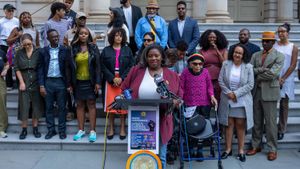Following Donald Trump's historic comeback to the White House during the 2024 presidential elections, many sectors of American society are reflecting on the complex aftermath of his electoral victory. Trump's unexpected and decisive win over former Vice President Kamala Harris has reignited discussions around civil rights, generational divides, political strategy, and media influence, as the nation braces itself for the impact of his second term.
Greeting supporters at Joint Base Andrews after his tumultuous farewell to Washington on January 20, 2021, Trump declared, "Goodbye. We love you. We will be back in some form," hinting at his return. Four years later, this prophecy has been realized—not without controversy—against the backdrop of his legal troubles and the chaotic political environment.
After losing the presidency to Joe Biden, Trump faced intense scrutiny, including four indictments and 34 felony counts. Despite this turbulence—and perhaps partly due to it—he has managed to galvanize his base. His narrative during the campaign centered on combating what he called "political oppression" and claimed his legal challenges fueled voters' anger against the establishment.
According to reports, Trump's campaign relied heavily on unconventional platforms to tap new voter bases; his appearances on podcasts and social media allowed him to reach younger demographics disenchanted with traditional media narratives. This strategy was particularly effective among Gen Z voters, many of whom spent their formative years during Trump's first term and were swayed by his assertive stance on masculinity discussed during podcasts like The Joe Rogan Experience."
It was not just younger voters who shifted—Trump also made significant strides with Hispanic and Latino male voters, capturing 46% of their votes, compared to just 32% four years earlier. This change is attributed to factors like socioeconomic issues, rather than direct immigration concerns, observed political analysts. Trump’s rhetoric on various platforms aligned with these voters’ values, challenging previous assumptions about their political leanings.
On the flip side, the election's outcome has precipitated widespread anxiety among marginalized communities, particularly transgender individuals. With promises to roll back protections for these groups, Trump's administration signals potential policy shifts reminiscent of the challenges faced during his previous term. Reports indicate the LGBTQ+ community, especially trans youth, are experiencing heightened distress and vulnerability following the election.
Atticus Sparks, 18, shared his concerns about personal safety amid growing anti-trans sentiment linked to Trump’s victory. Following the disappointing results of the election, advocacy groups reported astronomical increases—700%—in crisis hotline interactions for LGBTQ+ youth, signaling urgent needs for mental health resources.
Experts warn of impending challenges against decades of progress on LGBTQ+ rights, noting Trump’s rhetoric around gender ideology and educational policies aimed at fostering traditional family values. Many fear upcoming judicial appointments and policy implementations may significantly infringe upon civil liberties traditionally afforded to LGBTQ+ individuals.
Throughout the campaign, Trump's fiery and extended speeches far outpaced Harris'. A detailed analysis revealed Trump spoke roughly 172 hours compared to Harris' 69, showcasing his substantial on-the-ground presence and media engagements. Such verbosity allowed him to maintain visibility and frame the national discussion around his agenda, even as Harris was busy preparing her campaign, leading to more compact and fleeting appearances.
Despite the efforts of progressive candidates like Harris, her inability to effectively connect with voters—in part due to her association with Biden’s legacy—hampered her appeal. Pundits debated whether her demographics as the first woman of color to lead the main party ticket were adequate to sway public opinion against Trump’s seasoned political theatrics. The discontent surrounding economic woes and shifting demographic interests hovered over the election, creating fertile ground for Trump's populist messaging.
At the electoral parties held post-election, many at Western Washington University felt the weight of defeat after cheering Harris’ candidacy. "I was very optimistic about Harris winning — which, in retrospect, I probably should not have been," reflected Sophia Maynard, sharing how the mood shifted from collective excitement to despair as ballots tallied increasingly favored Trump.
The emotional fallout has prompted educational institutions to respond proactively. Various self-care initiatives have emerged throughout campuses, aiming to address the mental and emotional turmoil experienced by students. Support animals and therapeutic activities aimed at fostering dialogue and solidarity have surged, providing necessary respite from the stresses of political discourse.
Shifting political landscapes have also brought forth concerns about future legislative directions and community reaction to the current electoral outcome. Individuals on campuses across the nation question the ramifications of Trump's renewed presidency, with many feeling unprepared for the heated ideological battles anticipated to follow.
The struggle for identity within political spaces prompts analysis beyond just election outcomes; generational experiences play pivotal roles. Discussions among students at Western displayed varied perceptions, with some embracing the political climate as reflective of broader shifts within the country, others sought solace and community connection amid fears of regression.
There's mention of the new 'podcast generation' influencing political narratives, with candidates increasingly engaging with questionable sources claiming political authority or insight. The growing mix of influence from non-traditional media sources highlights the difficulties political candidates may face bridging the gap between message and messenger.
With the road to the next four years paved with promises of both division and cohesion, the question looms: How will Trump's administration evolve from the challenges of his past tenure? The path forward could redefine priorities for various community demographics across America, whether shaping them directly through policy or indirectly through the social climate around them.
While Trump’s overwhelming re-election win may not dictate uniform public sentiment across the nation, its unique challenges certainly call for engaged civic conversations and active representation within diverse communities. For many, the recent elections represent more than political wins or losses; they serve as snapshots of American identity, weaving complex tapestries of generational hopes and fears.



